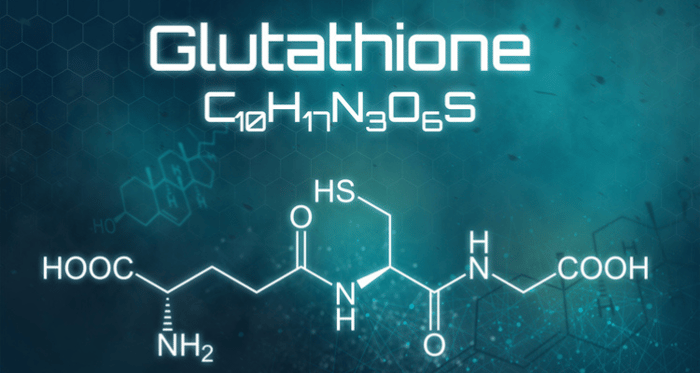
"Antioxidant” and “free radical” have become well-known words in recent years. Free radicals are widely thought of as the force working against healthy aging and antioxidants as the supporting force.
While there is no quick fix for improving health, glutathione comes close. Sometimes referred to as the body’s “master antioxidant,” glutathione plays a fundamental role in almost all systems and organs and is essential for protection, energy production, hormonal balance, and detoxification, among other processes.*
The body produces glutathione by itself, but certain modern-day lifestyle factors contribute to suboptimal levels.* Supplementation can be helpful, but finding the right supplement, delivery system, and dosage isn’t as straightforward as most nutraceuticals.*
To understand the challenges consumers and practitioners face in effectively increasing blood levels of GSH, it’s essential to first gain a bit of perspective on how this nutrient works and its roles in the human body.
what is glutathione?
Glutathione is a small protein called a tripeptide composed of three amino acids: glycine, cysteine, and glutamic acid (aka, glutamate). Some refer to it as the “master antioxidant” because it plays a significant role in the body’s ability to utilize and recycle other antioxidants like vitamins E and C, CoQ10, and alpha lipoic acid.*[1]
Glutathione comes in two forms: oxidized glutathione (GSSG, or the inactive form) and reduced glutathione (GSH or L-glutathione, the active form). GSH actively attends to oxidative free radicals and, in doing so, becomes oxidized and converts to the inactive GSSG. This inactive form of glutathione can be recycled back into GSH with the help of an enzyme called glutathione reductase. However, cell damage can occur with insufficient amounts or improper functioning of this enzyme (if it becomes overwhelmed, for example, with excess GSSG).*

WHAT DOES GLUTATHIONE DO IN THE BODY?
Glutathione plays a role in most bodily processes.* Inadequate amounts can lead to many discomforts and potential health issues, lower glutathione levels may stem from genetic factors, diet, lifestyle, and age.* The following are several examples of glutathione's foundational roles in human health.*
SUPPORTS HEALTHY AGING*
Low levels of glutathione have been linked with premature cell death, also called apoptosis, and higher levels are linked with longevity.*[2] When the body has enough glutathione, it can help to maintain energy levels, promote a healthy inflammatory response, support cognitive activity, and normalize metabolic functions.* The more glutathione the body has, the healthier your mitochondria and cells.*
ANTIOXIDANT SUPPORT*
Antioxidants are best known for their healthy aging benefits, as they help to protect your body from oxidative stress, or free radical damage.* A certain amount of free radicals is unavoidable and normal—the body naturally produces energy and releases free radicals as byproducts of this process. Free radicals are forms of oxygen missing an electron and are highly reactive with everything they come into contact with, including healthy cells and DNA. Antioxidants essentially help counteract this normal exchange between cells and free radicals and help to lessen its damaging effects.
Glutathione binds to and neutralizes oxidative compounds such as carbon radicals, hydroperoxides, superoxide, nitric oxide, peroxynitrites, and lipid peroxides.*[3]
Promotes energy production*
Mitochondria are the energy-producers of each cell and depend on glutathione for protection.* When free radicals damage mitochondria, their activity becomes sluggish, and they can contribute to further mitochondrial oxidation. Decreased mitochondrial function greatly contributes to feelings of tiredness, weakness, and health challenges.[4]
HELPS TO MAINTAIN PROPER DETOXIFICATION*
Perhaps the most notable role of glutathione is how it supports detoxification.* Specifically, glutathione is essential for phase II detoxification, which acts directly on the harmful substances within the body that have been partially broken down in phase I, like heavy metals.* This process is called conjugation and is made possible by glutathione.*
These four functions of glutathione are only some examples of the critical roles it plays in the body.* There are several contributing factors that may lead to depleted levels of glutathione, such as harmful substances within the body, everyday stress, genetics, overuse of alcohol or other substances, smoking, as well as aging.
SHOULD YOU SUPPLEMENT WITH GLUTATHIONE?
While serum glutathione tests exist, they tend to be expensive and highly specialized. Some integrative doctors may determine that low levels of glutathione may be related to potential health issues, anxiousness, trouble sleeping, everyday stress, and metabolic issues.*
Diet is, as always, an important first step in boosting and maintaining glutathione levels by eating foods high in the precursors of selenium, sulfur, zinc, and alpha lipoic acids.* Cruciferous vegetables (kale, arugula, broccoli, cauliflower, cabbage), liver, beef, oysters and other seafood, eggs, and Brazil nuts are examples of foods rich in these nutrients.*
Supplementing directly with glutathione can be tricky, as not all forms are well absorbed.* Until now, most practitioners have recommended liposomal glutathione delivery or other pure glutathione products.
The probiotic strain lactobacillus fermentum ME-3 has also been studied as a highly effective antioxidant and antimicrobial strain that is particularly beneficial for cognitive function and brain health, mainly because it produces glutathione.* Supplementing with ME3 in conjunction with whey-encapsulated glutathione has been studied as an effective glutathione therapy, as it seems to significantly increase blood levels, along with supporting the immune system, normalizing inflammatory pathways, and aiding in detoxification.*[5]
CONCLUSION
Modern life challenges the body to deal with onslaughts that didn’t exist for earlier humans. As everyday stress and harmful substances may increase in day-to-day life, the importance of optimal glutathione levels has been highlighted. Support health by focusing on a diet rich in glutathione precursors and considering direct supplementation with whey protein-encapsulated glutathione.*

[1] National Center for Biotechnology Information. PubChem Compound Summary for CID 124886, Glutathione. https://pubchem.ncbi.nlm.nih.gov/compound/Glutathione. Accessed Nov. 20, 2023.
[2] Blankenberg S, Rupprecht HJ, Bickel C, Torzewski M, Hafner G, Tiret L, Smieja M, Cambien F, Meyer J, Lackner KJ. Glutathione Peroxidase 1 Activity and…N Engl J Med. 2003;349:1605-1613. doi:10.1056/NEJMoa030535.
[3] Deponte M. The Incomplete Glutathione Puzzle: Just Guessing at Numbers and Figures? Antioxid Redox Signal. 2017 Nov 20;27(15):1130-1161. doi: 10.1089/ars.2017.7123. Epub 2017 Jul 19. PMID: 28540740; PMCID: PMC5661824
[4] Ribas V, García-Ruiz C, Fernández-Checa JC. Glutathione and mitochondria. Front Pharmacol. 2014 Jul 1;5:151. doi: 10.3389/fphar.2014.00151. PMID: 25024695; PMCID: PMC4079069
[5] Lactobacillus fermentum ME-3 sponsored by Essential Formulas, Inc. Revolutionizing Glutathione… Natural Medicine Journal. June 24, 2019.


















